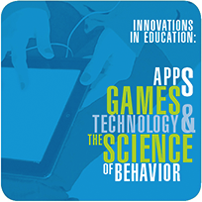
The Intersection of Behavior, Education, and Technology
Janet Twyman, Ph.D. (University of Massachusetts Medical School/Center on Innovations in Learning)

Janet S. Twyman, Ph.D., BCBA, is a noted proponent of effective instructional practices. She is committed to evidence-based instruction and has a strong record in the transfer of instructional technology and developing web-based programs for wide-scale distribution. A career educator, she has been a preschool and elementary school teacher, a principal and administrator, and university professor. She has worked directly with typically developing students, preschoolers with intellectual disabilities, young adolescents with emotional and behavioral problems, and learners with autism spectrum disorders. As vice president of Instructional Development, Implementation, and Research at Headsprout, she led the design, development, and dissemination of the company’s highly regarded educational programs, and oversaw program implementation in over 1,000 public and private schools. Dr. Twyman has served on the boards of numerous organizations including the Cambridge Center for Behavioral Studies (where she chaired the Education Group) and PEER International (assisting township schools in Port Elizabeth, South Africa). In 2007-08 she served as president of ABAI. As associate professor of Pediatrics at the University of Massachusetts Medical School/E. K. Shriver Center, she focuses her time on evidence-based innovations in education and the systems that support them to produce meaningful difference in learners’ lives. Dr. Twyman was also recently named as the director of Innovation & Technology for the U.S. Dept. of Education’s national Center on Innovations in Learning.
Abstract: It's not a matter of whether or not new digital technologies will revolutionize education—they are, have, and will continue to do so. Digital education is not just another fad or reform; it signals a major phase change in transforming teaching and learning. Tremendous synergy exists between such disruptive developments such as personalized learning (individualizing education not just for instruction but also interest), learning analytics (using formative and summative evaluation to determine what works from students to schools), online, hybrid, and blended delivery models (which promotes greater instructional reach), gaming technology (the clear use of levels, badges, mastery, and goals in learning), and much more. Will behavior analysis add to innovation and lead early adoption, or simply follow along with the majority, or even lag behind? Tremendous opportunities exist for behavior analysis to lead and support vital change, and this conference offers an exceptional opportunity for behavior analysts to both learn about and learn how to transform education.
Back to Previous Page